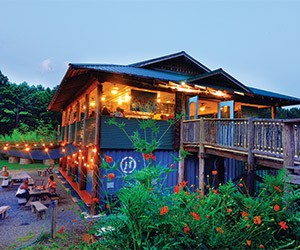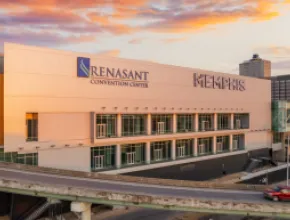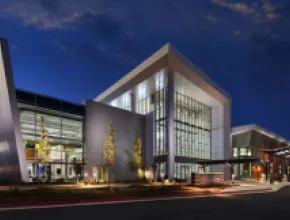In its 2016 North Carolina Clean Energy Industry Census, the Raleigh-based NC Sustainable Energy Association (NCSEA) called cleantech “a major economic driver for the state,” accounting for nearly 1,000 companies, more than 34,000 full-time jobs and $6.4 billion in annual gross revenues.
Spanning clean economy sectors, from alternative fuel vehicles to wind energy, much of the activity is concentrated in the Triangle region, including the Research Triangle Cleantech Cluster. Local enterprises include Durham’s Harvest Wave Energy, focused on transforming energy from ocean waves into power. At Duke University, which holds its annual Energy Conference this November, Duke Environment Hall is the new LEED Platinum-certified 70,000-square-foot home of the Nicholas School of the Environment.
In this robust environment of green innovation, groups will find much to “sustain” healthy and productive meetings for years to come.
Raleigh
According to a 2016 analysis from the NCSEA, energy costs are the second-largest municipal operating expense for North Carolina’s capital, one of the fastest-growing cities in the U.S.
Calling investment in renewable energy “key” to Raleigh’s continued growth and leadership, the report named the LEED Silver-certified Raleigh Convention Center’s solar rooftop array and electric vehicle charging station as examples of the city’s “commitment” to sustainability. It’s a pledge with groups very much in mind.
“Raleigh has become a pioneer of true sustainability, paramount in a state known for its natural beauty,” said Loren Gold, executive vice president at the Greater Raleigh CVB. “With our airport and many major event venues and hotels also LEED-certified, we go to great lengths to work with planners to ensure their sustainability initiatives are met and often exceeded by our own standards.”
Setting a high green bar has earned the city, which hosts the annual State Energy Conference in April 2018, a host of accolades in recent years. The first North Carolina center to achieve a 4-STAR Community Rating, a robust sustainability measure of cities nationwide, Raleigh is also the world’s first “LED City” for its pioneering municipal use of low-impact, high-efficiency Light-Emitting Diodes (LED) technology. With more than 50 LEED-certified projects area-wide and 11,000-plus acres of greenway trails, parklands and lakes, plus a green transportation system, groups can go green at every turn.
Sustainability showcases for meetings and events include the LEED Platinum-certified Nature Research Center (NRC) at the North Carolina Museum of Natural Sciences, the state’s most visited attraction. From seated dinners for 120 on its first floor to receptions for 250 on its top fourth level, NRC events include access to, or views of, the iconic three-story SECU Daily Planet theater and exhibits such as “Our Changing Ocean,” housed in a 10,000-gallon aquarium. The museum’s director, Emlyn Koster, Ph.D., is among the passionate local leaders featured in the CVB’s “Rooted in Raleigh” campaign and has been responsible for bringing several large-scale meetings and events to the city (see “Business Means Meetings,” page 20).
Beyond environmental and human health issues, sustainability today also encompasses diverse economic and CSR practices. The CVB has these covered as well, participating in annual volunteer programs while also coordinating service project opportunities for groups with Raleigh-based partner Activate Good. In addition, Centerplate, catering services provider for the Raleigh Convention Center, routinely supplies unused food to the local food bank and shelters.
Durham
Sustainability is equally in Durham’s DNA, as April Ellerbe, director of sales and services at the Durham CVB, explained.
“From historic adaptive reuse spaces that preserve Durham’s unique character, to chefs who use local ingredients and downtown rooftop beehives, Durham’s spirit of preservation and sustainability is everywhere,” Ellerbe said. “Durham is an attractive destination for socially conscious planners seeking to do more than just have a great meeting.”
True to Durham’s enterprising and eclectic character, sustainability comes in many shades of green.
PageBreak
The rooftop apiaries, for example, are an initiative of Durham-based Bee Downtown. Founded by NC State University graduate Leigh-Kathryn Bonner, this buzzing company offers area businesses the opportunity to sponsor their own rooftop beehive, or at landmark locations around the region, while it provides the care and maintenance. With the Bull Durham Beer Company and Research Triangle Park among many area participants to date, groups can arrange tours or educational programs to learn more about these precious pollinators.
Celebrating its 26th anniversary this year, The Scrap Exchange is a “creative reuse arts center” dedicated to promoting “creativity, environmental awareness, and community through reuse.” Group programs include creative classes, hands-on art-making field trips, teambuilding workshops and art parties.
With meeting space for 150 attendees, the 128-room Hilton Garden Inn Durham/University Medical Center is among 10 green or LEED-certified Durham County buildings for meetings and events. Reflecting a comprehensive “green renovation,” sustainable practices at the historic 17-room King’s Daughters Inn, with space for 60 in the largest of three meeting rooms, include low-flow bathroom fixtures, LED lights, a fully integrated energy management system, 10,000-gallon rain water cistern and rain garden, a pervious concrete parking lot and native plants.
Other group properties committed to eco-friendly practices include the JB Duke Hotel and Washington Duke Inn & Golf Club.
North Carolina’s first LEED-designed restaurant, contemporary Mexican eatery Mez offers 900 square feet of private group space on the second floor with large windows and an outdoor terrace.
Chapel Hill
Completing the Triangle’s clean coordinates is Chapel Hill.
“From eco-friendly hotels to sustainable farms and gardens, the destination strives to implement socially responsible practices for the betterment of our community and the environment,” said Marlene Barbera, sales director at the Chapel Hill/Orange County Visitors Bureau.
Green gems include the North Carolina Botanical Garden. As an environmentally focused “conservation garden,” this sprawling facility, comprising 10 acres of display gardens and walkable natural areas, advances the concept of a sustainable relationship between people and nature. Overlooking gardens and the Piedmont Nature Trails area, the LEED Platinum-certified James & Delight Allen Education Center offers multiple spaces for indoor and outdoor events.
Offering a unique sanctuary just 15 minutes from downtown in the pastoral Chapel Hill countryside, the open-air Honeysuckle Tea House is a timber structure built from repurposed materials and raised on four shipping containers. With features including an apothecary, tea and herbal farm, music venue and “hammock garden” for relaxing, the space offers educational workshops, yoga and monthly garden tours.
With origins in the 1800s and a tradition of best management conservation practices since the early 1930s, Maple View Farm is an award-winning all-Holstein dairy in Hillsborough. At the Maple View Agricultural Educational Center, groups of 120 can gather and learn about sustainable agriculture and farm life through education programs and hands-on experiences.
Opened in May 2017, the new 110-room Hyatt Place Chapel Hill/Southern Village, offering 1,740 square feet of flexible, high-tech space, was purpose-located to take advantage of existing public infrastructure. It features sustainable solutions including bicycle parking and electric vehicle charging stations, an aggressive recycling program, water-saving fixtures, indigenous plants requiring minimal watering, and a mix of LED and natural light systems.
Other eco-focused group properties include the LEED Silver-certified Hampton Inn & Suites Chapel Hill–Carrboro/Downtown; the 1924 Carolina Inn, on the Destination Earth environmental sustainability program; and pursuing LEED certification ahead of its anticipated September 2017 opening, the new AC Marriott Chapel Hill Downtown.







